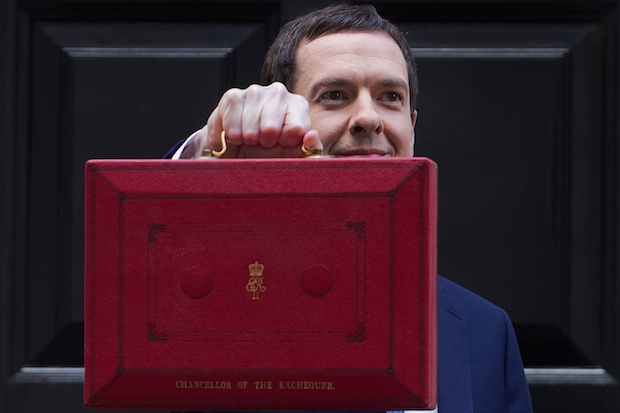[audioplayer src=”http://rss.acast.com/spectatorpolitics/georgeosbornesbudget-2016/media.mp3″ title=”Fraser Nelson, Isabel Hardman and James Forsyth discuss today’s Budget”]
Listen
[/audioplayer]There were two striking things about George Osborne’s Budget today. The first was that having made sure that the weekend papers carried reports of all the pain that he was going to have to inflict on the nation to help it weather the economic storm that is coming, the Chancellor then barely mentioned what that pain would entail.
He built up the start of his speech by lecturing the Commons on the necessity of the pain, warning that ‘we have a choice: we can choose to add to the risk and uncertainty, or we can be a force for stability’. But he then limited the detail of the cuts to:
‘I am asking my right honourable friends the Chief Secretary and the Paymaster General to undertake a further drive for efficiency and value for money. The aim is to save a further £3.5 billion in the year 2019-20. At least than half a per cent of government spending in four years’ time, that is more than achievable while maintaining the protections we have set out. At the same time we will continue to deliver sensible reforms to keep Britain living within its means.’
The rest of the Budget was about giveaways or Osborne steering away from changes that would have upset the Tory backbenches. But the Chancellor went straight on from his line about the £3.5 billion in spending cuts to defending the government’s record on disability cuts. Clearly the Chancellor worries that this is an issue that Labour could build a narrative on. He was also very keen to set out a sense of a moral mission, by talking about the importance of education reform, and by saying ‘I am not prepared to look back at my time here in this Parliament, doing this job and say to my children’s generation: I’m sorry’.
That last line, which was Osborne justifying the sugar tax, was introducing one of the most controversial policies of the Budget. the rest of it was strikingly cautious: the Chancellor is clearly not keen for any sort of fight with his backbenchers at all. He announced that he was freezing fuel duty for the sixth year in a row, for instance. The bravest thing he did was to warn about the risks of Britain leaving the European Union, which fitted perfectly in a Budget about the dangers of not being ready for ‘whatever the world throws at us’, as he put it. But a line like that has its own risks. Perhaps Osborne felt that he could deploy it as the biggest risk in a very cautious Budget.







Comments